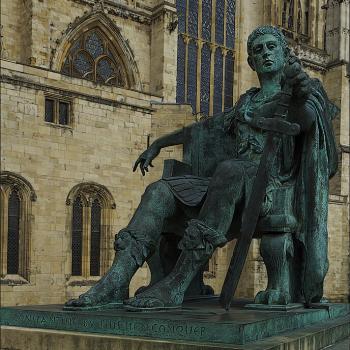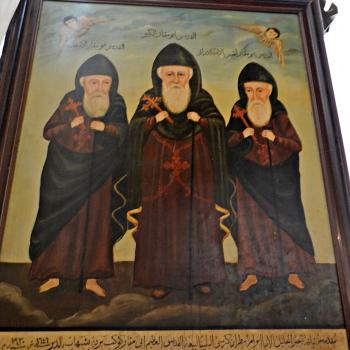Editor's Note: Below is a "Monday Sermon," our attempt at Patheos' Preachers Portal to provide sermons that pastors can enjoy and learn from. It is our hope that this particular series from Daniel Harrell, which preaches through the Church Fathers, will encourage pastors, show them a way of approaching theological education from the pulpit, and refresh their theological memories.
See Reverend Harrell's columnist page for more information.
Among the greatest and undoubtedly most prolific of the Church fathers was Saint Augustine. Translator F. J. Sheed writes that "every person living in the Western world would be a different person if Augustine either had not been, or had been other than he was." Augustine wrote 117 books that touched on practically every central theme of Christian theology and practice. Augustine's writings are so numerous and comprehensive that it would be much easier to compile a list of what he didn't cover than it would be to catalogue all that he takes up in his major works, sermons, and vast correspondence.
Augustine was born on November 13, 354, in what is now Algeria. His father was a pagan who later converted to Christianity, but his mother, Monica, was a devout Christian from the start who prayed and labored tirelessly for her son's conversion. She taught Augustine the faith throughout his childhood, but his baptism was delayed until 387 due to a lengthy religious and philosophical pilgrimage, which he outlines in his most popular work, Confessions. Educated as a rhetorician in North Africa, Augustine eventually came under the influence of the Roman philosopher Cicero through which he embarked on an earnest quest for divine wisdom. Like many such quests, his search at first led him away from the Christian faith of his childhood.
Augustine struggled particularly with the timeless problem of evil. Given a God who is truly good, how could evil exist? Where did it come from? How was it possible for an omnipotent God to permit evil's existence if it were in his power to rein it in? Desire for a rational solution to this perpetually thorny dilemma led him to Manichaeism, a syncretistic, dualistic Persian philosophy that combined elements of Zoroastrian, Christian, and Gnostic thought. Manichaeism held as a fundamental principle that two equivalent powers (Good and Evil, Light and Darkness, God and Satan) were engaged in continual warfare, duking it out over possession of the universe. This seemed to fit with Augustine's experience of things and so he adopted it as a plausible hypothesis upon which to construct his own view of the world.
However, after nine years of Manichaeism, Augustine grew disillusioned both with its insistence on asceticism as a means to salvation and its hyper-rationalism. So around 383 he left his job as a teacher in North Africa and headed for Rome. A year after that, he landed another teaching position in Milan where he met the distinguished bishop of Milan, Saint Ambrose. Through Ambrose, Augustine became reacquainted with Christianity (and subsequently convicted by it). This forced him into what he described in Confessions as "a great tumult of my inner dwelling place I stirred up against my own soul in the chamber of my heart."
Sorrow and self-scrutiny grew regarding his own personal perniciousness. "Why this monstrousness?" he agonized. "What is the root of it? Does the answer lie in some mysterious punishment that has come upon people, some deeply hidden damage in the children of Adam? The mind gives the body an order, and is obeyed at once. The mind gives itself an order and is resisted." One day, in the midst of this distress, he suddenly heard what sounded like the voice of a child saying in sing-song fashion, "Take up and read." He interpreted this voice as a divine appeal to take up and read the first passage he turned to in his Bible. It happened to be Romans 13:13-14, ". . . not in orgies and drunkenness, not in sexual immorality and debauchery, not in dissension and jealousy. Rather, clothe yourselves with the Lord Jesus Christ, and do not think about how to gratify the desires of the sinful nature." "I had wish to read no further, and no need," he wrote, "for in that instant, with the very ending of that sentence, it was if the light of utter confidence shone in all my heart and all the darkness of uncertainty vanished away." Ambrose baptized Augustine on Easter Eve in 387 in answer to his mother's prayers.
Augustine's Confessions surges forth in lush and lyrical professions of his new love for God. "Not with uncertain, but with assured consciousness do I love Thee, O Lord." Augustine sang, "What is it that I love in loving Thee? Not corporeal beauty, nor the splendor of time, nor the radiance of the light, so pleasant to our eyes, nor the sweet melodies of songs of all kinds, nor the flagrant smell of flowers, and ointments, and spices, not manna and honey, not limbs pleasant to the embracements of flesh. I love not these things when I love my God; instead I love a certain kind of light, and sound, and fragrance, and food, and embracement in loving my God, who is the light, sound, fragrance, food, and embracement of my soul -- where that light shines which no place can contain, where that sound peals which time can not snatch away, where there is a fragrance which no breeze can disperse, where there is a food which no eating can diminish, and where that clings which no satiety can sunder. This is what I love, when I love my God."





